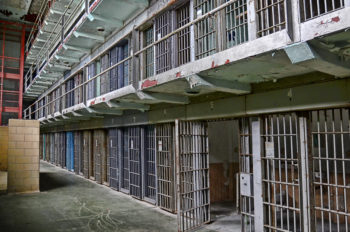
An old prison cell block. (Credit: Wikipedia/Bob Jagendorf)
The U.S. news magazine Mother Jones sent reporter Shane Bauer undercover as a prison guard at a facility run by the private company Corrections Corporation of America (CCA). During that time, Bauer worked at the then-CCA facility Winn Correctional Center in Winnfield, Louisiana.
Since undercover reporting isn’t a common method in U.S. journalism, iMediaEthics contacted both the magazine to learn more about its decision and the prison company to learn how CCA has responded.
“Is there any other way to see what really happens inside a private prison?” reporter Bauer, who was held hostage in Iran from 2009 to 2011, asked in his piece. Obviously, Bauer answered that question with a resounding ‘no’, and Mother Jones‘ editor-in-chief Clara Jeffery agreed that it made his up-close look at private prisons possible.
However, Jonathan Burns, the CCA’s Director of Public Affairs, disagrees, complaining in a statement sent to iMediaEthics that Mother Jones‘ defense was disingenuous.
Why Mother Jones Went Undercover
Burns complained that it was “an outright falsehood” for Mother Jones to say it had to go undercover to get the real story since no one at the magazine had contacted CCA for an interview or to visit the facilities. According to CCA’s records, only once has CCA heard from Mother Jones after Bauer’s undercover stint — back in 2012 when CCA provided a statement to a reporter as requested, Burns said. (That 2012 article is here, iMediaEthics notes.)
Burns also noted that “in the past year alone, dozens of mainstream media outlets have been to our correctional and detention facilities, including The Wall Street Journal, the New York Times, National Public Radio, Fox News, Al Jazeera, The Washington Times, Univision, Telemundo, The Atlanta Journal-Constitution and The Oklahoman, among others.”
In response to Burns’ complaint, Mother Jones pointed iMediaEthics to its editor’s note by Jeffery which reads in part:
“We took these extraordinary steps because press access to prisons and jails has been vastly curtailed in recent decades, even as inmates have seen their ability to sue prisons—often the only way potential abuses would pop up on the radar of news organizations or advocates—dramatically reduced. There is no other way to know what truly happens inside but to go there.”
Bauer told iMediaEthics by e-mail he wanted to have “full access” to a private prison.
“I decided to apply for a job as a prison guard because it was the only way to get full access to the prison. Prisons in the United States generally are extremely secretive. I have come against many walls in my reporting over the last several years, including corrections departments refusal to comply with public records laws. Private prisons are even more secretive. They are subject to many of the public records laws that public prisons are. CCA has lobbied to stop bills that would give reporters greater access to private prisons.”
Mother Jones further backed its case up, explaining in its editor’s note that its reporter Bauer used his real name and Social Security number to apply, so he wasn’t lying about his identity. For employment, Bauer said he worked for the Foundation for National Progress. That foundation publishes Mother Jones. “He did not lie,” Jeffery wrote. In his article, Bauer noted the prison company contacted him quickly after he applied for the job, explaining:
“They didn’t ask about my job history, my current employment with the Foundation for National Progress, the publisher of Mother Jones, or why someone who writes about criminal justice in California would want to move across the country to work in a prison. They didn’t even ask about the time I was arrested for shoplifting when I was 19.”
Burns disagreed, saying Bauer used “false pretenses and was disingenuous in his portrayal of his profession and employer.” Mother Jones told iMediaEthics, “Bauer truthfully listed his employer as the Foundation for National Progress, which is the publisher of Mother Jones.”
CCA found out about Bauer’s undercover work last year, when CCA arrested Mother Jones photographer James West for trespassing when he was trying to take photos of the then-CCA prison where Bauer was working. When the photographer was arrested, Bauer quickly quit. West wrote his own article for Mother Jones about the arrest.
What do Ethicists Say
Journalism ethics codes, such as the U.S. Society of Professional Journalists, dictate that reporters only go undercover if there is no other way to get the story and the story is clearly in the public interest. In an e-mail to iMediaEthics, the SPJ’s ethics committee chair Andrew Seaman noted the SPJ’s code “does not forbid undercover reporting,” but instead advises against going undercover “unless traditional, open methods will not yield information vital to the public.”
Seaman told iMediaEthics, “In my opinion, the best approach is to make sure a journalist or news organization exhausted all possible reporting avenues before considering undercover or surreptitious. Even then, though, the information contained in the resulting story needs to be so vital to the public that it excuses the breach of trust, which is the foundation of journalism.”
In a July column, Ethics AdviceLine for Journalists’s Casey Bukro asked why Mother Jones didn’t use “conventional reporting” first. “The long Mother Jones report does not appear to contain any evidence that it first tried normal journalistic techniques and encountered obstacles,” Bukro wrote. “No doubt that would have tipped off CCA that Mother Jones was taking an interest in its operations,” Bukro acknowledged, but pointed out that CCA runs more than 60 prisons, Mother Jones could have tried to report conventionally, and then gone undercover if that failed.
“The earlier attempt using conventional reporting could be part of the story, showing why the undercover work was necessary in the public interest,” Bukro suggested.
Fact Checking & Questions
Mother Jones said that after Burns’ four months undercover, the magazine spent another 14 months doing more reporting and fact checking. Mother Jones told iMediaEthics, “We asked CCA more than 160 questions during our reporting and fact checking, over a period of months, many of which it did not provide substantive answers. CCA also refused multiple requests for an interview.”
CCA’s Burns, however, remarked that CCA didn’t hear from Mother Jones or Bauer until six months before publication, eight months after Bauer quit.
In a lengthy statement sent to iMediaEthics, Burns accused Bauer of an “activist agenda” and Mother Jones of “low journalistic standards.” He said in part:
“From the start, Mother Jones clearly intended to publish a deliberate hit piece to advance a predetermined premise at the expense of numerous laws, widely accepted journalistic standards, a fully informed readership and even the safety and security of a correctional facility. This point is underscored by the numerous examples in the piece in which the reporter clearly admits failing to perform the security duties of his job, which were intended to keep inmates and his colleagues safe. Time and time again, Mother Jones engaged in reckless, dishonest and illicit conduct and failed to demonstrate a serious interest in a genuine and productive exchange of information about the complex issues at hand:”
Burns said CCA responded “to more than 160 questions with over 50 pages of information” and said CCA wasn’t given enough time to respond to “29 detailed questions” sent “just days before the piece was published.” Regarding those 29 questions, Mother Jones told iMediaEthics, “Most of these questions involve an article that has yet to be published. CCA has not responded to them to this day.”
Bauer added in an e-mail to iMediaEthics, that CCA “sometimes denied outright things that I had witnessed” when he sent questions for his story.
“They refused to provide much of the information I requested, including their own policies,” he said. “At one point, CCA tried to intervene when I made a public records request to Texas, asking for a list of legal settlements made by CCA. The company claimed that such a list constituted trade secrets and should be exempt from disclosure. The company’s lack of transparency to the public is well established.”
CCA also sent “more than 18 corrections and clarifications” requests to Mother Jones after publication, which are all listed here. When asked about those corrections requests, Mother Jones told iMediaEthics, “It is noteworthy that they had no complaints about any of the reporting that Shane did on Winn itself. In regards to incidents at other prisons, we added some detail in the online version of the article in response to CCA’s comments. ”
(In response, CCA’s Burns told iMediaEthics that Mother Jones left out “key context” about CCA and Winn, which he said caused both to be “portrayed in a false light”.)
There are currently three footnotes at the bottom of the article that read:
“*This sentence has been revised for accuracy.
“**Correction: A production error that caused an incorrect figure has been fixed.
“†These sentences have been clarified.”
CCA called for Mother Jones to disclose that George Soros’s Open Society Foundations donated both to the magazine and to an anti-private prison groups. Mother Jones told iMediaEthics, “Mother Jones received no funding from OSF while working on this project, and no such funds were put toward it.”
CCA: We haven’t talked to Frank VanderSloot
In her editor’s note about the decision to have Bauer go undercover, Jeffery said that CCA suggested it was going to sue Mother Jones over its reporting. The magazine received a legal threat “not from CCA’s in-house counsel, but from the same law firm that had represented a billionaire megadonor in his three-year quest to punish us for reporting on his anti-LGBT activities,” Jeffery wrote.
In late 2015, Mother Jones announced that it had won a libel lawsuit filed by Idaho billionaire Frank VanderSloot, as iMediaEthics reported at the time.
iMediaEthics asked the CCA’s Burns about this. Burns explained CCA contacted Clare Locke, the Virginia law firm that represented VanderSloot since it had previous experience with Mother Jones.
“It would’ve been irresponsible for our company not to seek legal advice when a media outlet undertook actions that could’ve impacted the safety and security of the inmates and staff at the facility, particularly with a media outlet as unscrupulous as Mother Jones,” Burns told iMediaEthics.
Burns quoted from the ruling in the case between VanderSloot and Mother Jones and added, “As with any legal case, you want to hire a firm with familiarity of the issue, and Clare Locke has the most experience dealing with Mother Jones’ biased and unethical brand of journalism.”
When asked if CCA had been in touch with VanderSloot, Burns said that “CCA has never had any contact with Mr. VanderSloot.”
Problems at the Prison?
CCA’s Burns also accused Bauer of endangering the prison and its inmates. iMediaEthics asked Mother Jones about that claim, to which it responded: “The article provides ample detail about the training and guidance Bauer received from CCA.”
Bauer told iMediaEthics denied the claims, noting he was told he was doing well at the prison and offered a promotion.
“To CCA’s claim that I put the inmates at risk: After working at Winn for just two months, I was named for promotion. I had been told by supervisors that I did an exemplary job as a corrections officer. There was extremely low morale among officers at Winn. Guards rarely did mandated security checks. Many guards recorded events in log books, like security checks, that did not occur. These issues existed well before I arrived at Winn. My work partner, Dave Bacle, told me at one point, ‘You are nothing but a body to them. That’s the way I feel.'”
Burns argued Bauer and Mother Jones‘ actions caused problems at the prison. For example, Burns wrote, “There are numerous examples in the piece where he clearly admits to failing to perform the security duties of his job.” Burns pointed to quotes from Bauer’s articles saying he told some inmates to “hide their contraband better” and let an inmate go swap food for cigarettes.
CCA claimed “many” of Bauer’s allegations were “vague, poorly sourced and contained egregious factual inaccuracies,” but that it responded “seriously” and “appointed an independent, outside investigator to review the matters.” In a follow-up e-mail, CCA said, “we have taken his allegations seriously, as any responsible company would.”
CCA said it “encouraged” Bauer to contact the investigator with his concerns but Bauer never did, and that Bauer should also have reported his concerns as per the CCA Code of Conduct. Mother Jones responded to iMediaEthics, “We asked CCA to pass along any questions the independent investigator might have. We received none.”
Burns also noted CCA is no longer managing Winn because “we felt that Winn ultimately could not be managed to our company’s standards within the budget constraints.” In May 2015, CCA ended its contract with Winn, the Times Picayune reported.







Comments Terms and Conditions